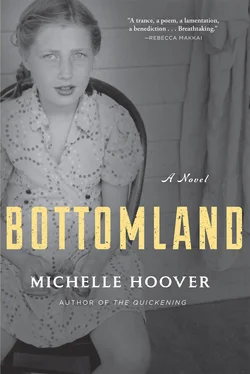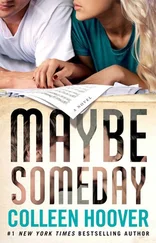Mother would have fixed me plenty of rolls. She’d have tied an apron to her waist and filled the stove with wood. I could have done that for her, filling the stove, but she always shook her hand at me and did it herself. Mother’s apron was white with blue stitches. It had flowers instead of birds. That apron of hers smelled of bread and something else. The smell of the river and the high cutting grass. I’d smelled it up close after the accident, when I sat at the table and she pressed my head to her chest. She wouldn’t let me go for days after that.
If Helen had asked, I’d tell her that’s why I was on the train. It was the accident that drove me to the war. It was the war Mother couldn’t stand. Somehow, some way, something got broke. That’s how I figured it. And when Esther and Myrle went off, it felt the same. It was me who broke it from the beginning. Me and the stone in my pocket. Now I was going to bring my sisters back.
The woman next to me woke with a kind of yip. “Ah, you’re still here,” she said. The train was moving again. Out the window, the fields whipped by like a wind. Helen looked as if she’d aged five years just by sleeping.
“Ma’am?”
“You don’t need to call me ‘ma’am.’”
“Sorry, ma’am. Do you know Chicago?”
“A nasty place, those factories. No place for a farm boy.” She yawned. “But I suppose they need them. The factories. My sister lives farther out of the city. That’s why I’m going. Otherwise, I’d never step foot. A boy like you, you’re not going there for work?”
I frowned. What kind of boy did she mean? Closer to Chicago, other trains cut past, near as spitting. Far off, towers smoked, buildings shouldering each other and too many people. Since the war, I’d forgotten there could be so many at once. The kind of boy who forgot, I guessed. The car was shaking. I thought it’d shake us straight off. But with the woman next to me and my stomach full, I grew some sure of myself.
“No work,” I said. “My sisters live there too.”
The train station in Chicago was brownstone and granite, close to a river and smelling the way rivers do. Grand Central they called it. But the words sounded wrong. Central wasn’t so grand, not the way a sky was, or a summer storm. But words were better than numbers. It was numbers I forgot. How many months it took to get me home from the war. How many days this time I’d been gone. The station was high as barns. Higher than that. Glass and steel, the floor a shiny kind of stone. From the roof, a rush of voices dropped like a single thing. Outside the streets went off in every direction, the smell of burning. The clock tower was the tallest structure yet, pinning the station to the ground. I crouched against it. That wall was steady, at least, my head full of engines. All I knew about the place was that my sisters didn’t belong.
“You’re white as a ghost.”
I blinked. The sun seemed brighter than it’d been. There was Helen, holding her bag. Others circled her feet. The sack I’d brought had only a poster of the girls. A blanket and a change of trousers. A square of soap. “I’m not used to the place is all.”
“I supposed you’d be long gone,” Helen said. She tapped the watch on her wrist. That blank space in my head, sometimes I lost minutes to it.
“Tell you what,” Helen said. “You help me with these bags and I’ll give you something for your pocket. My sister can’t lift a spoon.”
“I couldn’t take money from you, ma’am. I’d do the bags for the rolls.”
“That was a favor you did me, eating those. And look at you.” She touched my forehead.
“I’ll be all right.”
“Hot as a gourd. I’ll give you something for a good meal. Just a dollar for help with the bags. Any more and my sister will think I’ve gone loony.” She studied me. “You don’t know where your sisters are, do you?”
I wiped at my eyes.
“Are they together?”
“We think so.”
“Do you have an address?”
I shook my head.
“Where do they work? Do you even know that?”
“Sorry, ma’am.”
She stepped back and squinted at me. “Are they as young as you, these sisters?”
I nodded.
“They’re even younger, aren’t they?”
“Afraid so.”
“My dear, dear boy. You’re lost as a pup. You’ll never find them here.”
A trembling worked in my insides. That buzzing in my head, it was more than engines. I slumped against the wall and closed my eyes.
“Oh now, I didn’t mean to scare you worse,” Helen said. A car pulled up behind us and she gave it a glance. The car was running, but the sister didn’t get out. Helen lifted my chin. “The factories, that’s where you should start. Back of the Yards, in New City. Might take you hours to walk it, but the elevated is terrible for nerves, cost you some pennies too. You’re young enough to go without it. Then I’d try the boardinghouses. If they’re here at all, that’s the only proper place for a girl to find sleeping quarters.” Eyeing the car, she opened her purse and drew out a map. She pressed it flat against her thighs. “Look,” she said and pointed. “There’s the yard. That’s the closest of the factories at least, though there’s hundreds. And up here, whole streets of houses for workers. The Germans. ” She stopped. I nodded it was all right. “. They’re the ones who tend to the Near North Side. Or at least they did.”
Helen eyed the car again. The sister had rolled her window down. “I’ve got to go.” She put the map in my coat pocket and I helped with her bags. When I closed the car’s boot, I was a run of sweat. But for those minutes of lifting, I knew the work even if I didn’t know anything else. Helen opened her purse and dropped a dollar in my hand. Too much for bags.
“Lee, you’re a good boy,” she said. “I know you won’t listen, but I think you should leave those girls be. Go home. They’re surely here for their own reasons. You have to take care of yourself.”
She got in the car and went off, waving to me before she was out of sight. I pulled the map from my pocket. It was worse than ten years old and thin as a leaf. In the corner the words chicago title and trust co. in red ink. Circles in the same ink grew around a center point. A mile marked by one circle. Two miles by one bigger than that. It was to that center point Helen thought I should be going. A place of some importance with so many street crossings, the names crowded and hard to read. Still, a good half of the map was nothing but white, and inside that, the words lake michigan.
I folded the map straight, careful not to rip the edges. I thought of what Helen had said about home. It was late morning on the farm. Nan would be in the garden, readying the winter vegetables for canning. She’d rake hay over the rest. After their chores, Patricia and Agnes would come in for noon dinner. Ray after that. But Father wouldn’t. He’d stay in his room until dark. Maybe he’d go sit in his dugout. At the table, they’d have five empty places. One for Father. One for Mother. Two for the girls and one for me. If I could, I’d take four of those empty places back. Lee , Esther had asked. You know how to trick that lock, don’t you? If a girl asked for it?
The doctors said I’d been in the hospital from fall to spring. Half a year, they’d said. I couldn’t account for that. They said I’d have some trouble accounting for many things. I’d want to keep clear of noise, not work too hard when I got home. But home was work, I said back.
Now Chicago, that was work and noise both, and I’d been in the place only hours. I raised my collar to my ears. The city felt used. The men walked with their hats low, the women with purses tight to their elbows. Trains rattled overhead, fast with the smell of oil, the streets beneath shadows. Along every window and in the alleys, gray spots of snow. By midafternoon, my map was a sore piece of paper and I’d searched only a few blocks. The factories in the yards were wide and long as fields. High as three houses put together, sometimes more. The windows on the upper floors looked dark. The glass up there hardly bigger than a porthole, but what a noise. I imagined whole rows of engines behind those walls. Lines of wheels, pistons, and belts. And such a whir, the whole building breathing together. I breathed hard myself. Back of the Yards was a funny name, but it felt right. Nothing save brick and stone. Everyone was at work inside.
Читать дальше












